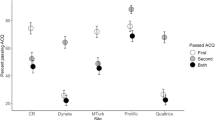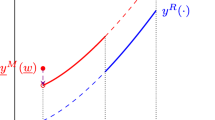Abstract
A competitive rent-seeking club (CRSC) offers its members the chance of winning a prize (status, position, privilege) by being selected, typically, by a civil servant or a politician. The selector replaces in our setting the usual contest success function; instead of determining the winner on the basis of the club-members’ efforts, he selects the winner on the basis of quality. This article focuses on the effect of incomplete search of the selector on the efficiency of democratic self-governing and decentralized RSC’s that control admittance to the club and its transparency, assuming that quality of their members is fixed. The incomplete search of the selector is assumed to take the simple form of fixed random sampling of the contestants—the members of the CRSC. Our results imply that, even when active rent-seeking expenditures are disregarded, the decisions of CRSC’s regarding their composition and transparency tend to reduce quality and are therefore inefficient.
Similar content being viewed by others
References
Amegashie AJ (2000) Some results on rent-seeking contests with shortlisting. Public Choice 105: 245–253
Baik KH (1999) Rent-seeking firms, consumer groups, and the social costs of monopoly. Econ Inq 37(3): 542–554
Baik KH (2008) Contests with group-specific public-good prizes. Soc Choice Welfare 30(1): 103–117
Baik KH, Kim I-G, Na S-H (2001) Bidding for a group-specific public-good prize. J Public Econ 82: 415–429
Benesch C, Frey B, Stutzer A (2006) TV channels, self control and happiness. Working Paper 301, Institute for Empirical Research in Economics, University of Zurich
Congleton RD, Hillman AL, Konrad KA (eds) (2008) Forty years of research on rent seeking. Springer-Verlag, Berlin
Cornes R, Sandler T (1996) The theory of externalities, public goods, and club goods. 2. Cambridge University Press, Cambridge
Deneckere RJ, McAfee RP (1996) Damaged goods. J Econ Manag Strategy 5(2): 149–174
Dyer O (2003) Heart surgeons are to be rated according to bypass surgery success. BMJ 326:1053-a
Ellingsen T (1991) Strategic buyers and the social cost of monopoly. Am Econ Rev 81: 648–657
Fabella RV (1995) The social cost of rent seeking under countervailing opposition to distortionary transfers. J Public Econ 57: 235–247
Gans J, Smart M (1996) Majority voting with single crossing preferences. J Public Econ 59: 219–237
Gradstein M (1995) Intensity of competition, entry and entry deterrence in rent-seeking contests. Econ Polit 7: 79–91
Hausken K (2005) Production and conflict models versus rent seeking models. Public Choice 123(1–2): 59–93
Konrad KA (2009) Strategy and dynamics in contests. Oxford University Press, Oxford (forthcoming)
Nitzan S (1994) Modelling rent-seeking contests. Eur J Polit Econ 10: 41–60
Nti KO (1997) Comparative statics of contests and rent seeking games. Int Econ Rev 38: 43–59
Rubinstein A (1998) Models of bounded rationality. MIT Press, Cambridge
Rubinstein A, Salant Y (2006) A model of choice from lists. Theor Econ 1: 3–17
Sah RK, Stiglitz JE (1986) The architecture of economic systems, hierarchies and polyarchies. Am Econ Rev 76: 716–727
Author information
Authors and Affiliations
Corresponding author
Additional information
We are especially indebted to Arthur Fishman, Martin Kolmar, Nava Kahana and Klaus Schmidt for their insightful comments. Shmuel Nitzan is grateful to the CES at the University of Munich, the Tinbergen Institute at the University of Amsterdam, the CODE at the Universitat Autonoma de Barcelona and the IAE in Barcelona for their hospitality which enabled the completion of this study.
Rights and permissions
About this article
Cite this article
Nitzan, S., Kriesler, K. The effect of limited search ability on the quality of competitive rent-seeking clubs. Soc Choice Welf 35, 81–106 (2010). https://doi.org/10.1007/s00355-009-0431-3
Received:
Accepted:
Published:
Issue Date:
DOI: https://doi.org/10.1007/s00355-009-0431-3




